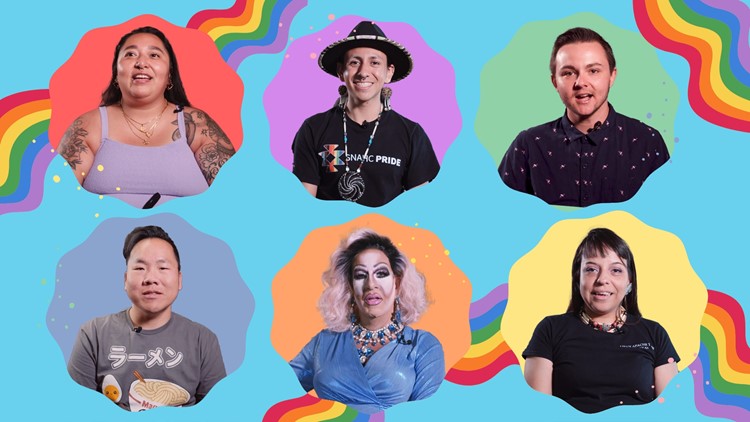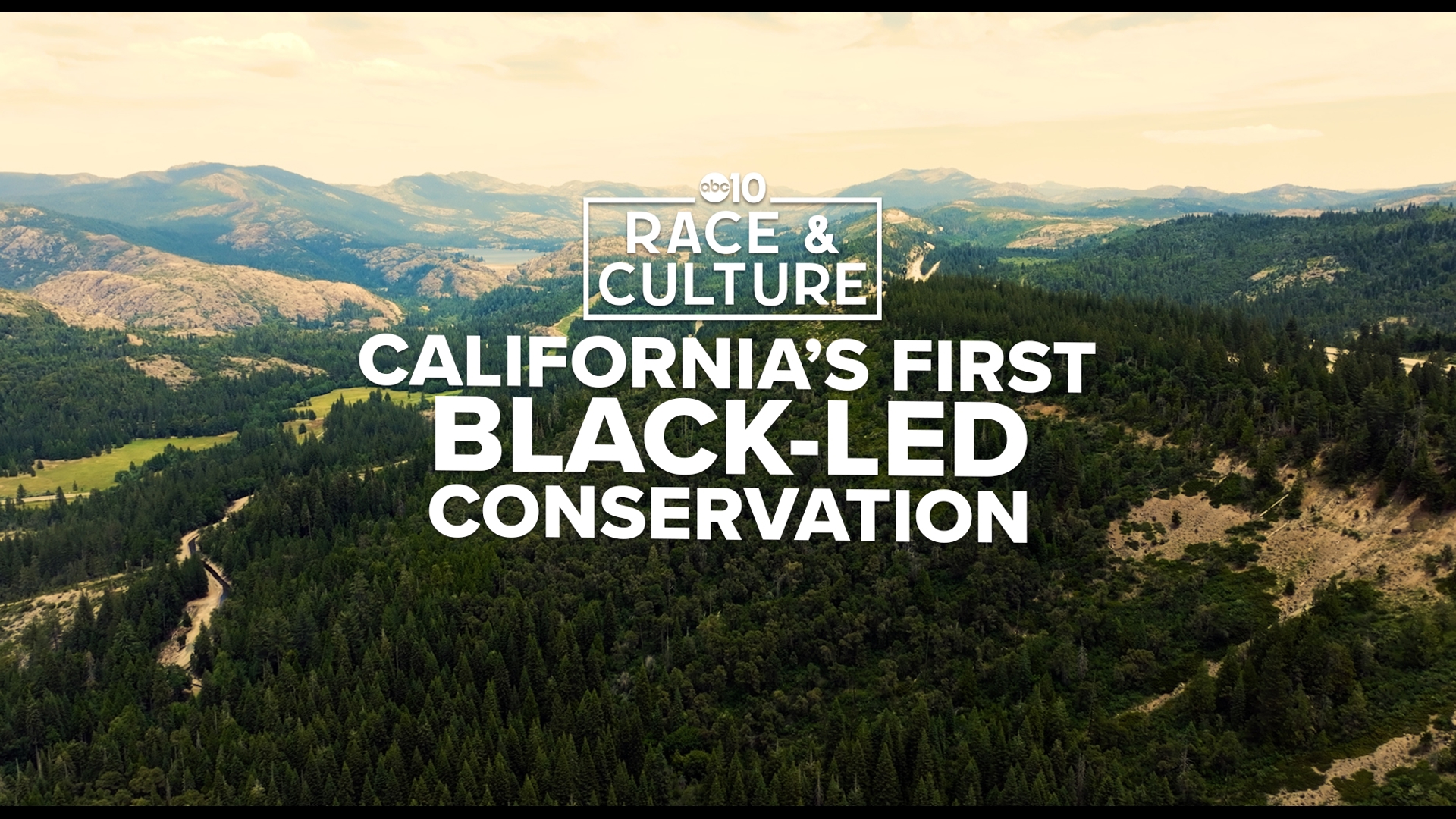SACRAMENTO, Calif. — Lesbian, Gay, Bisexual, Transgender and Queer (LGBTQ) Pride Month is celebrated every year during June to honor the 1969 Stonewall Uprising in Manhattan.
It's regarded as a tipping point for the Gay Liberation Movement in the United States. The month-long celebration is dedicated to recognizing LGBTQ+ Americans who have "strengthened our country, by using their talent and creativity to help create awareness and goodwill," according to the Library of Congress.
However, this year, Pride celebrations are continuing across the country against the backdrop of a record number of bills attacking LGBTQ+ rights, especially the transgender community. The Human Rights Campaign officially declared a state of emergency June 6 for LGBTQ+ people in the United States following the unprecedented spike in anti-LGBTQ+ legislative assaults.
Across Northern California, ABC10 covered canceled drag shows, clashes at LGBTQ+ events with white supremacist groups and death threats to a Placer County pastor who founded a support group for LGBTQ+ youth. In response, the LGBTQ+ community has come back stronger with celebrations and parades.
ABC10 asked six LGBTQ+ identifying people across Sacramento to describe what Pride Month means to them and how to be an ally.
Is there a person or place we should highlight during Pride Month? Email ABC10's Race and Culture team, raceandculture@abc10.com.
GET MORE RACE & CULTURE FROM ABC10:
►Explore the Race & Culture home page
►Watch Race & Culture videos on YouTube
►Subscribe to the Race and Culture newsletter
Vay Van
Vay Van (He/Him) grew up with four siblings but has always felt different from them — not only as the only American-born child in his Chinese American family, but also as a gay man. Van said growing up, culturally, he was taught to hide his feelings and emotions, which impacted how he was able to express himself authentically.
While looking for ways to get involved in the community, Van stumbled on a kickball league in Sacramento under OutLoud Sports, formerly known as the Varsity Gay League. Since joining in 2020, he's been able to build camaraderie within the gay community.
Van said creating safe spaces is important for any culture, group or identity. For him, safe spaces have allowed him to find a sense of belonging and show up authentically among likeminded people.
Marisela Featherstone
Marisela Featherstone (They/Them) identifies as Two-Spirit, nonbinary and pansexual. The term Two-Spirit is used by Indigenous people in North America to describe their gender and/or spiritual identity. While Featherstone also identifies as part of the LGBTQ+ community, they said the two terms are not interchangeable and some may identify with only one. For Featherstone, being Two-Spirit means acknowledging and honoring divine duality within one's own body, both masculine and feminine energies.
Creating space for those who are Two-Spirit and/or LGBTQ+ identified is deeply personal for Featherstone. Their aunt Jessica Perez, who died when Featherstone was just 11, was transgender and a diabetic with an amputated leg and AIDS. She struggled all her life breaking and pushing through colonial barriers. And while it was difficult to find acceptance from her family, Featherstone always loved her unconditionally.
Today, Featherstone says they are proud to be part of the Lipan Apache Tribe of Texas, which has affirmed Two-Spirit people. In a post, the tribe stated, "Indigenous people have always known and respected our Two Spirit people, most of them are medicine people and keepers of some of the most traditional ways and knowledge."
DoMe Moore
DoMe Moore (She/Hey/They), a drag queen in Sacramento, is perhaps best known for hosting her monthly Drag Queen Bingo events at Mango's, where proceeds benefit various charities. But before that, Moore first got involved in the drag scene back in the early 90s with the Imperial Court of Sacramento.
Over the years, Moore said she's been inspired by different mentors and drag mothers in the community who have helped her come into her identity. While her style and look has become her own, in the past, her inspirations have been Cher and Dolly Parton.
Amidst a rise in hate against local drag performers and events, Moore said she wants people to know that drag performers are simply there to entertain and not hurt anyone. Outside of drag, Moore is a shy, gay man who works a full-time Monday to Friday job in the restaurant industry. They can always be found in the kitchen, either at work or at home. Moore even has a cookbook, called "DoMe Moore In the Kitchen," which is supporting a culinary scholarship under the Rainbow Chamber of Commerce.
Lauren Pulido
Lauren Pulido (He/Him) always knew he was queer*, but he didn't come out as transgender until 2017-2018. He said at the time, he didn't have the language to describe himself due to a lack of access to education and stories that reflected his own experiences. That's why he's since dedicated himself to serving the LGBTQ+ community.
Pulido is the outreach and engagement manager at the Sacramento Rainbow Chamber of Commerce, which provides local LGBTQ+ and allied business owners with access to growth opportunities, resources and networking. But before that, Pulido was the first person in Sacramento State history to graduate with a minor in LGBTQ studies in 2019, a curriculum he helped create. He said he wanted to ensure more representation of himself and others in the LGBTQ+ community.
When discussing trans-related issues, Pulido encourages people to educate themselves about what trans-related health care is, what it looks like and how they can be affirming. He said education is particularly important as more bills are being introduced nationwide that target transgender youth.
*The term Queer was previously used as a slur but has been reclaimed by many parts of the LGBTQ+ movement, including by those who do not identify as exclusively straight and/or folks who have non-binary or gender-expansive identities.
Olivia Hernandez
Olivia Hernandez (She/Her/Femme) is a second-generation Mexican American who identifies as a pansexual, bisexual or fluid cis-gender woman, depending on who's asking, as well as solo polyamorous and "high femme with a sprinkle of butch." She said all of these labels are more placeholders for how she feels in the moment, and she interchanges the labels to meet people where they're at in their understanding of LGBTQ+ identities.
Hernandez embodies her empowerment words — "fat, femme and fabulous" — wherever she goes. They show up in her art as a creative and artivist (artist and activist), all of which hold radical meanings, such as radical joy, radical love or radical healing. They also show up in her tattoos, which are markers of identities and places in her life where she finds strength.
Hernandez emphasized that the LGBTQ+ community is one with a strong legacy of relentless existence. She said no amount of hate or ignorance will erase that, and the community will continue to fight and advocate for spaces where they can exist and comfortably explore their curiosities.
Manuel "Manny" Luna
As a community health program manager at the Sacramento Native American Health Center (SNAHC), Manny Luna (He/Him/They/Them) focuses on prevention work and early intervention work surrounding suicide prevention and substance misuse education. He also connects youth and families with resources to feel supported.
That includes connecting folks to the Two-Spirit Talking Circle* at SNAHC, a space "to honor and support those in the Native American, Alaskan Native/1st Nations, and self-identified Indigenous People within the LGBTQI+ community," according to the SNAHC website.
That's where Luna was also able to explore their own Two-Spirit identity as well. He said he first came out to his family back between 2009-2010. That was also around the time when he also declared independence of his identity with friends and at school. After coming out to the world, he started to look inward to identify what Two-Spirit means to him.
Luna said one thing that's important to remember is that the term Two-Spirit was created for and provided to Native Americans. Although allies may want to use the term to describe themselves, it's important to be mindful of how using certain words could impact those who are Two-Spirit identified.
*The Two-Spirit Talking Circle is currently on pause, but will return at a later time.
We want to hear from you!
The Race and Culture team's mission is to serve our diverse communities through authentic representation, community engagement and equitable reporting.
Accomplishing our goals of inclusive reporting requires hearing from you. Is there a person or place that you want us to highlight? Email us at raceandculture@abc10.com or fill out the form below.



